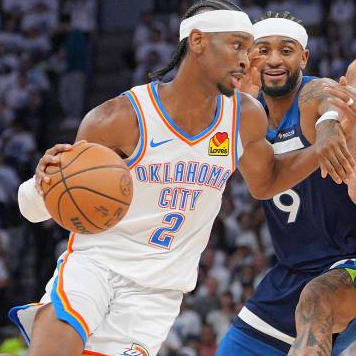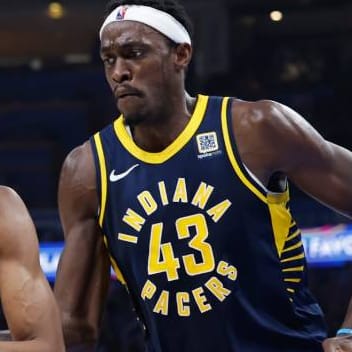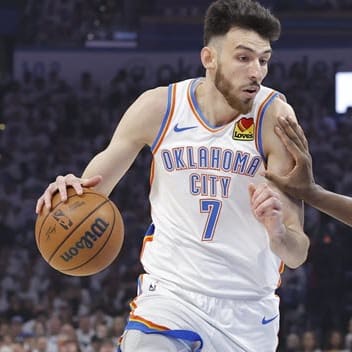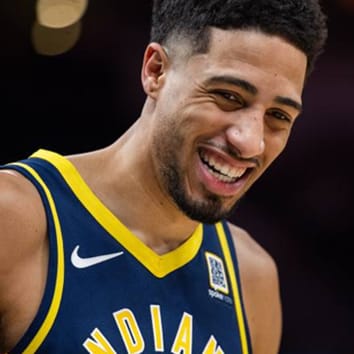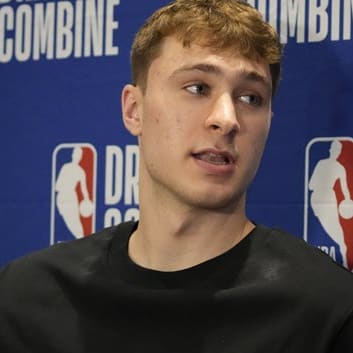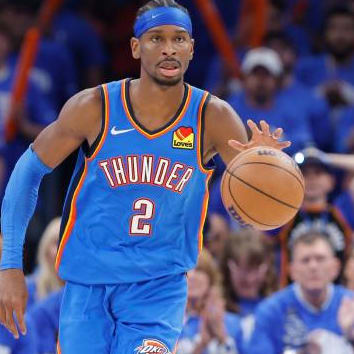This article is part of our The Give and Go series.
The Give and Go
By Charlie Zegers and Carson Cistulli
RotoWire Staff Writers
From: Charlie Zegers
Sent: Monday, January 25, 2010 1:38 PM
To: Carson Cistulli
Subject: Give and Go: Swap Meet
By the time this column gets filed, we'll be at t-minus three weeks from the February 19 trade deadline.
In most years, I anticipate the trade deadline the same way I look forward to big George Lucas sequel. I look forward to it, I'm glad to know it's coming, I hungrily devour all the rumors about the plot and characters, and I do all these things knowing full well that I will almost certainly be disappointed in the end.
(Apparently Harrison Ford is interested in doing another Indiana Jones movie, provided they can find a script that he, Lucas and Steven Spielberg all like. Does that imply that they collectively liked the script for Indiana Jones IV? Discuss.)
This season might be different. For a variety of reasons, the league could be set up for a series of deadline trades that will make the Bazaar at Istanbul look like a garage sale on a rainy day. We've got legitimate contenders, who might be just one or two players away from a title run - I'm thinking the Cavs, the Magic, the Celtics, the Nuggets… maybe even the Lakers and Blazers. Then we've got also-rans who can add millions to their bottom lines by getting under the luxury tax threshold - the Hornets and Jazz. We've got teams with stars on expiring contracts, in danger of losing guys like Chris Bosh and Amar'e Stoudemire and Carlos Boozer and getting nothing back. And then there are the teams that are perfectly willing to trade anyone, so long as it puts them in a better spot heading into this summer's free agent feeding frenzy.
C'mon NBA. There's business to be done.
Of course, the onset of the trading season brings the onset of… um… really creative journalism. It's easy to see why so many unrealistic and/or patently false rumors are floated in January and February. We love reading that the Lakers are considering a deal that would send Andrew Bynum to Toronto for Chris Bosh, or that David Kahn is offering Big Al Jefferson for Danny Granger. It doesn't need to be likely - or even true -- to drive page views.
(I was particularly amused by the Bosh for Bynum thing. You mean to tell me the Lakers are willing to give up a 22-year old legit seven-footer for a three-month rental that has already had trouble playing alongside another post-up big man? If I was Bryan Colangelo, I would have driven Chris Bosh to the Staples Center personally to complete that deal.)
In the last few days, some of the juicier rumors have been:- Devin Harris to the Lakers
- Amar'e Stoudemire causing static in the Suns' locker room, making a trade likelier
- Vince Carter to anyone willing to take him
- Nate Robinson to the Celtics
- Antawn Jamison to the Cavs
- Troy Murphy to the Cavs
- Andre Iguodala to the Cavs
(A lot of these rumors center on the Cavs, huh? Who knew the team with the second-best record in the league could be so needy?)
So here's my question: do you think we'll see a lot of deals between now and the deadline? Do you feel like any marquee names will be changing teams? Or will we just see more salary cap shuffles like today's Devin Brown for Aaron Gray trade? Are there any players you're buying or selling in fantasy leagues right now because of the possibility of trades? Or will this year's deadline be another big yawner… with Harrison Ford improbably surviving a nuclear test by hiding in an old refrigerator and then meeting aliens and entirely too much Shia LeBoeuf?
From: Carson Cistulli
Sent: Tuesday, January 26, 2010 8:32 PM
To: Charlie Zegers
Subject: Re: Give and Go: Swap Meet
Zegers,
Allow me to admit something from the get-go: the rules governing player movement in the NBA confuse the flip out of me.
I admit it freely, unembarrassedly*, for a few reasons. Mostly because:
1. Like our First President, I can not tell a lie,
2. I think I probably represent the majority of even pretty well-informed basketball fans,
and
3. I think -- most importantly, for the purposes of the present column -- it's fully possible to be a successful fantasy owner while having only a superficial understanding of player/salary cap law.
*Totally an actual word.
Still, even if that last point is technically true, there's obviously a certain amount of marginal value added to one's Fantasy Expertise by understanding the nuts-slash-bolts of player movement and, therefore, having the means to anticipate trades.
The sort of trade I legitimately understand is the sort that involves a player who's fallen out of favor with his present club. That's, for example, how I knew to pick up Al Harrington last year, when he and Don Nelson butted their differently coiffed but still equally bizarre-looking heads. Harrington ended up in the ideal situation: as a small/power forward in Mike D'Antoni's hyper-paced and undermanned rotation. Harrington ended up being like a top-30 player for the majority of the season. That's pretty decent from a waiver wire pick-up.
This year, roughly the same thing happened with Allen Iverson -- that is, he fell out of favor with his present team -- just with a different end. Instead of moving by means of trade, Iverson did the ol' retire-for-like-six-days-and-then-sign-with-a-new-team maneuver. Owing to his age and recent performance -- and to the pending return of Louis Williams -- Iverson wasn't quite as attractive a target.
Of the players you mention above, the one for whom this sort of trade is mostly likely has got to be Nate Robinson. Yeah, D'Antoni's inserted him back into the rotation, but -- and correct me if I'm wrong -- but it's a move intended to showcase Robinson for a prospective trade just as much as it is to help the Knicks win basketball games. As of now, the team most strongly tied to such a move is Boston. They've denied such a thing, according to the most recent reports I've heard. Then again, what would they say?
But let's shift to something that might be entertaining for the readership: my ignorance of player contracts and salary caps, etc.
I sorta know these things:
- That there are salary caps, first and foremost. You can go over the salary cap, but then you have to pay a luxury tax, which, if I'm understanding correctly, costs each respective club a dollar for every dollar they've exceeded the cap.
- That there are all kinds of "exceptions." A mid-level exception. A veteran exception. Another one called, like, a "Bird Exception" or "Bird Right" or something like that.
- That there are rookie contracts. That they last for two or three or four years. Maybe.
- That there are restricted and unrestricted free agents. That the terms "qualifying offer" and "offer sheet" somehow apply to one or the other of them.
And, most importantly for this discussion:
- That to make trades during the season (anytime, maybe?) salaries have to "match up" within a certain percentage of each other. That's why you don't see a whole bunch of "dump" trades in basketball like in baseball. Or, at least I think that's why.
Is that right? And: What else is important to know?
(Note: I hope I haven't made you dumber just for having read this email.)
From: Charlie Zegers
Sent: Wednesday, January 27, 2010 8:10 PM
To: Carson Cistulli
Subject: Give and Go: Swap Meet
You don't need to be a graduate of MIT to understand the salary cap, but it helps.
I don't think it's necessary for the average fantasy player to understand the rules that govern NBA trades. And frankly, when I'm appointed commissioner, one of my first actions will be to streamline the player movement process in a big way. The current system is set up to help good teams stay good but leaves bad teams - and, in particular, bad capped-out teams - no choice but to take their lumps and wait.
Of course, having a working knowledge of the rules can help when trying to anticipate the moves that might be made - and anticipating moves is one of the best ways to find bargains for your fantasy team. Therefore, I will attempt to impart some of my knowledge to you, grasshopper.
The NFL has a "hard" salary cap - there's a set limit, teams can't exceed it. The NBA cap isn't "hard." In fact, it's rather squishy. There are a wide variety of "exceptions" teams can use when they want to spend more than the cap allows. The most notable of those is the Bird Exception - often called "Bird Rights" - which allows teams to exceed the cap to re-sign their own players. (Larry Bird was the first player to sign under that clause, hence the name. I'm glad the first Bird free agent wasn't Uwe Blab.) There's another exception that allows teams over the cap to sign players for an amount equal to the average NBA salary for that year - that one's called the mid-level exception.
The exceptions explain, in part, the Knicks' current predicament. They re-signed Allan Houston to an outlandish contract using the Bird exception, then added players like Jerome James and Jared Jeffries using the full mid-level.
Being over the cap is a problem that snowballs. Trades become enormously complicated - the salaries of the players involved have to match. For a rebuilding team, the best option becomes trading for a bunch of contracts that expire in the same year and starting with a slate that's fairly clean. That's what teams like the Knicks, Nets, Heat, Bulls and several others have been doing for years now, in anticipation of next year's free agent class.
Then, there's the luxury tax. Simply exceeding the salary cap is merely inconvenient. Exceeding the luxury tax threshold costs a club money. Teams above the tax threshold pay a dollar-for-dollar penalty. That money is pooled and split by the teams under the threshold.
Case in point - last week, New Orleans was a couple million dollars over the tax limit. The trades of Devin Brown (for Aaron Gray) and Bobby Brown (for a second-round pick) put them under the limit. Now, instead of paying four or five million dollars into that luxury tax pool, they'll get a check that could be worth $5 million. That's a ten-million-dollar swing for a team that always seems to be struggling.
Knowing all that gave me an advantage. I knew New Orleans was likely to make a deal. And I knew Brown was one of the likeliest players to get dealt, because his contract expires after the season. That meant I could pick up a guy like Marcus Thornton and have confidence that he'd move into a starting spot sooner, rather than later. It doesn't always work - lots of people drafted Paul Millsap on the assumption that Carlos Boozer would get dealt during the season, but that sounds less and less likely. But it gives you something else to consider when looking through free agent lists or talking trades.
Here's another situation worth watching. Chris Duhon has been out-and-out awful for weeks now, but the Knicks are stuck with him; they don't have another point guard on the roster. Nate Robinson makes too many bonehead decisions with the ball and Toney Douglas is promising but raw. A capable point guard with a little offensive skill and an expiring contract - say, Milwaukee's Luke Ridnour - could put up very impressive numbers running that offense. I don't know if Donnie Walsh has the pieces to make a deadline deal but if the Knicks bring in a point guard of any discernable skill, claim him. You can thank me afterwards.
From: Carson Cistulli
Sent: Thursday, January 28, 2010 4:48 AM
To: Charlie Zegers
Subject: Re: Give and Go: Swap Meet
First off, Zegers, I'll you this: that's probably the first time I've ever been called grasshopper. In print, at least.
Second off, on account of the rigor you've shown during the present correspondence, you've shamed me into actually (gasp!) doing some research.
Jerk.
Anyway, it seems like there's one team all over the news right now that might be involved in some sort of trade soon: the Washington Wizards. Let's take a look at their situation.
According to Storytellers, Washington is $16MM over the cap -- which seems like an awful lot for a team that's both (a) currently eight games out of the final playoff spot in the East, and (b) without its best player (i.e. the very suspended Gilbert Arenas) for the remainder of the year .
Mike Jones of CSN Washington reports that the Wizards are currently fielding offers for Antwan Jamison, Caron Butler, and Brendan Haywood. Of the three, Haywood is probably the most attractive to other teams, on account of his contract is expiring, and his salary -- $6MM -- isn't crazy high. I've certainly heard rumors of his going west to Portland, which team is currently relying on the aged Juwan Howard to shoulder the load at center -- something he hasn't done for a long time.
Jones says the Cavs are inquiring about Jamison, although, as you noted, there are like fifty-hundred rumors associated with the Cavs right now. Jamison is signed for $13.6MM next year and $15.1MM the year after, so it might be harder to get rid of his contract. That said, Cleveland has both Shaq ($21MM) and Big Z ($11.5MM) coming off the books after this year, so if the club feels comfortable taking on the extra payroll in the short term (they're currently about $24MM over the cap), they might actually be in a position to afford Jamison afterward.
As for Caron Butler, I don't know. He's signed through next season for about $10.5MM. That doesn't seem particularly attractive for other clubs.
Anyway, as far as I see it, the interesting thing about a trade -- from a fantasy perspective -- is not necessarily how it affects the traded player, but moreso how it affects the team he's left behind. In the event that either Haywood or Jamison were to leave, I have to think that Andray Blatche would instantly become more relevant for fantasy purposes. As he is now, averaging just 20 or so minutes a night, he's just outside the realm of usefulness.
That said, there are signs that Blatche could be worth a roster spot given more court time. On a per-minute basis, he's above average in terms of rebounds and blocks. And as an added bonus -- and this is rare for a big man -- he's shooting an entirely reasonable 76% from the free-throw line this season. If you project him to 35 minutes or so, he becomes about a 15 PPG, 8 RPG, 1.5 BPG player with decent rates -- kinda like a poor man's LaMarcus Aldridge, maybe, although not really even that poor.
Of course, it's anyone's guess as to what happens, but, like you said with regard to Marcus Thornton: if you get the sense that a trade for either Jamison or Haywood is about to go down, Blatche should make a good, top-100 type pick-up.
Article first appeared on 1/28/10






